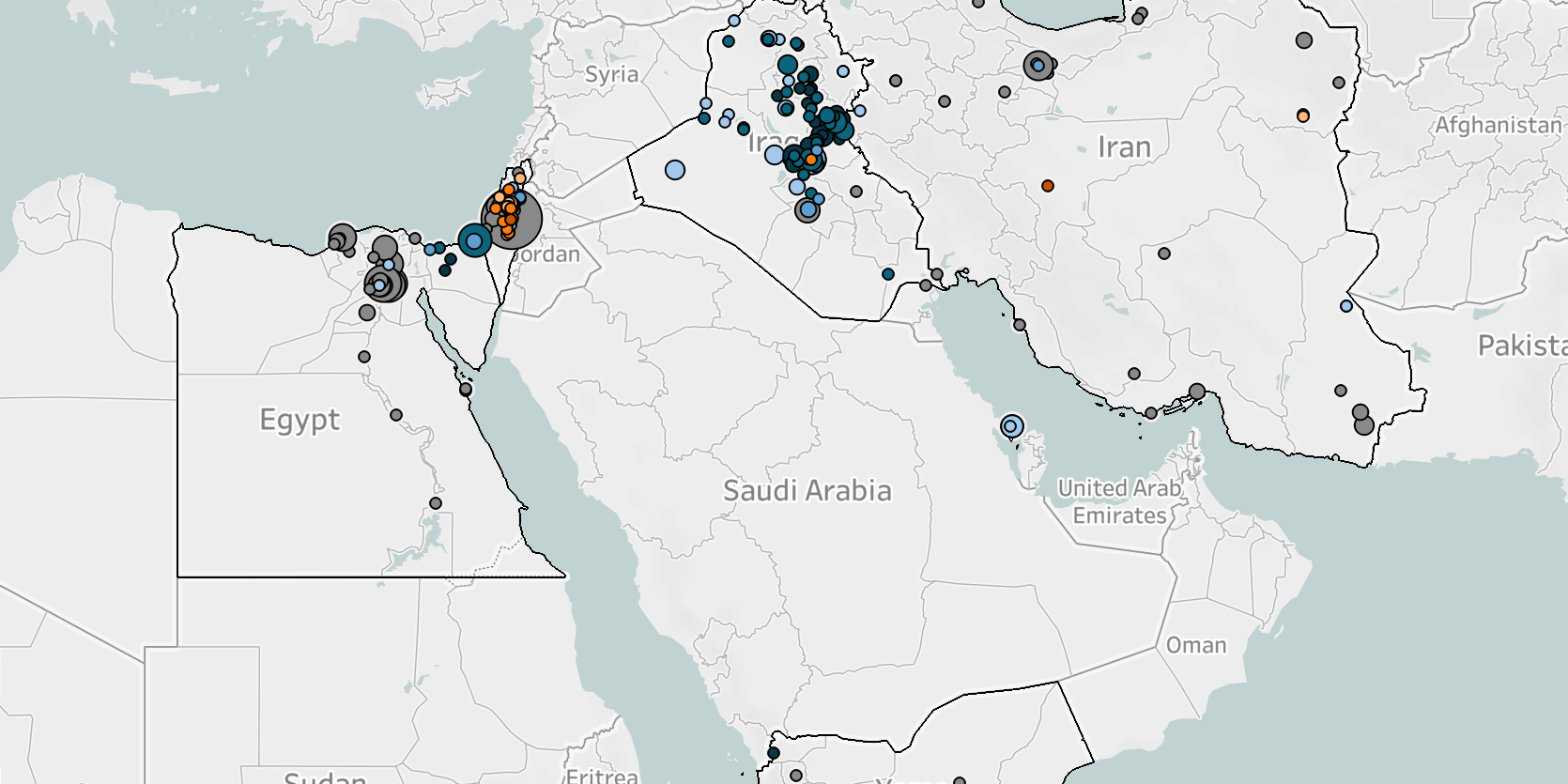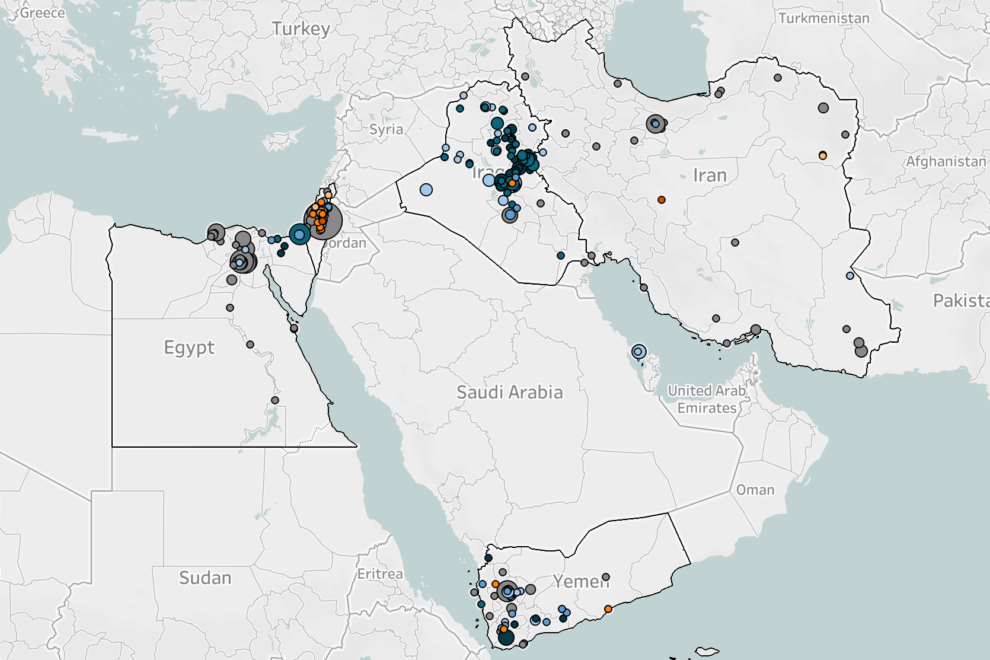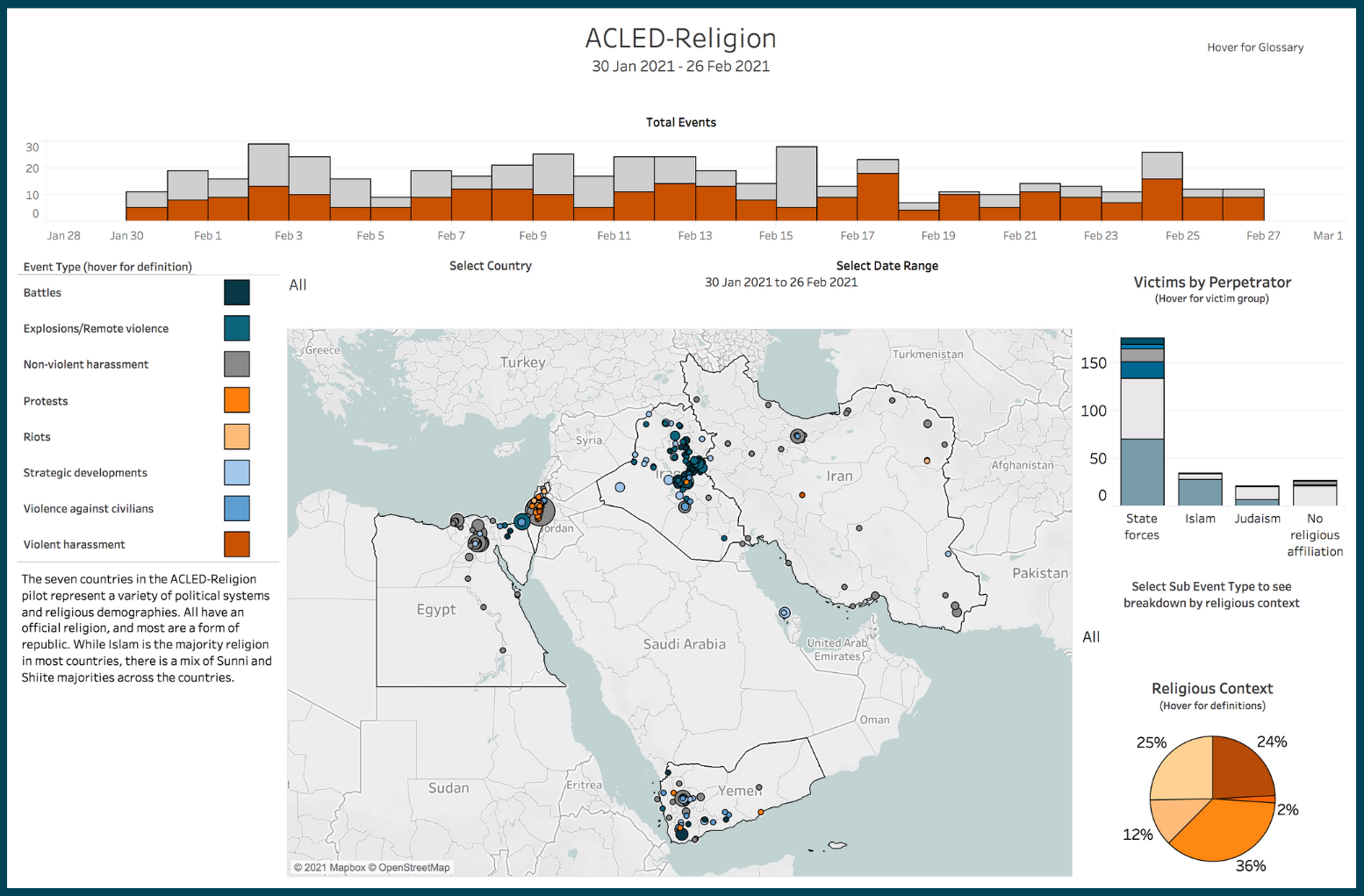ACLED-Religion was a pilot project collecting real-time data on religious repression and disorder. Building off ACLED’s core methodology, ACLED-Religion introduced new event types to capture religion-related violence and harassment while adding further information about religious dynamics and actors to existing ACLED data. All event types in the ACLED dataset exist in the ACLED-Religion dataset — coded using the same methodology — making it possible to compare events across both datasets. The pilot project covered seven countries in the Middle East and North Africa: Bahrain, Egypt, Iran, Iraq, Israel, Palestine, and Yemen.
What is ACLED-Religion? What does it cover?
There are many mantles under which individuals and groups organize to engage in violence — for example, politics, economics, or ethnicity. Groups use common ideologies to coalesce around a cause and use violent — and at times non-violent — strategies to accomplish them. Religion is one of these ideologies. Religion is often used to legitimize political institutions, mobilize social movements, or drive support for armed conflicts. Regardless of whether the actions are truly motivated by religious ideals, religion is used by state and non-state actors as a tool for consolidating power and building support (Scorgie-Porter, 2015; Sheikh, 2012; Basedau et al, 2016). Religion-based violence has seen an increase in recent years (Toft, 2007), with some even arguing that religious conflicts are more violent than other types of conflicts (Pearce, 2005; Toft, 2006).
Religion can be used to justify violent acts (e.g. by jihadist groups), to mobilize support for religious or political causes (e.g. by religious political parties), to consolidate power by targeting or ostracizing religious minorities, or to fuel inter-ethnic tensions (as ethnicity and religion are often closely linked). This is true across religions and political systems — from the Islamist political parties of the Middle East, to Christian militias in Africa, and Buddhist or Hindu nationalist groups in Asia.
At the same time, religion and religious individuals or groups can also be the target of political violence. Religious groups — whether in the minority or majority religion of the country — can be restricted in how they practice their religion, espouse their beliefs, or in the rights they are afforded.
ACLED-Religion is an event-based dataset of political violence and demonstrations involving religion. It builds off of the more general ACLED dataset of political violence and demonstrations. It does so in two ways: by adding information about religious dynamics and actors to events already captured by ACLED, and by adding new events and event types to capture religious repression that does not fit ACLED’s mandate and hence is not captured in the ACLED dataset. All event types in the ACLED dataset exist in the ACLED-Religion dataset — coded using the same methodology — making it possible to compare events across both datasets.
Access the full ACLED-Religion methodology brief for more information.
How does it intersect with the main ACLED dataset?
The ACLED and ACLED-Religion datasets have many events in common. This is because all ACLED event types are included in ACLED-Religion’s event types. Further, events are largely coded based on the same rules — with the caveat that ACLED-Religion events must involve a distinct religious element.
For this reason, ACLED-Religion researchers and their ACLED counterparts are in close contact with one another during coding, discussing and sharing events that the two datasets have in common. In cases when one dataset issues a correction to an event, the event is also corrected in the other dataset, if the correction is relevant to that dataset. This synchronization means that the ACLED dataset is complementary to the ACLED-Religion dataset, and can be used by users to shed light on political violence and demonstrations that may not be related to religion yet impact the larger landscape of a country.
In cases where an event is present in both the ACLED and ACLED-Religion datasets, the ACLED-Religion version of the event will have the ACLED ‘EVENT_ID_CNTY’ value recorded in the ‘ACLED_ID’ column.
Access the full ACLED-Religion methodology brief for more information.
What are 'religion-related' events?
All ACLED-Religion events occur within the larger context of the political and social environment of a country; therefore, no event is purely religious in nature. It can be impossible to determine whether an action was motivated by religion, especially when relying on secondary sources as ACLED-Religion does. For this reason, ACLED-Religion does not assume that the motivation of an event is religious. Rather, the inclusion of an event in the dataset is based on:
- Whether it has a clear religious element because of the involvement of religion-based actors,
- Whether it includes the targeting of individuals engaging in religious practice or expressing their religious belief,
- Whether it involves the enforcement of specific religious norms to force or prevent actions, and/or
- Whether it involves actors from a designated religious cleavage.
Access the full ACLED-Religion methodology brief for more information.
Does ACLED-Religion have a partner network?
Yes, ACLED-Religion maintains a unique data collection network of international and local partners active in the project’s seven pilot countries. Learn more here.
- Overview of ACLED-Religion’s pilot methodology
ACLED-Religion Methodology Brief
- Explanation of ACLED-Religion’s coding decisions for religious repression and disorder
- Instructions for downloading data from the ACLED-Religion API
Weekly Overviews & Reports
Data
The ACLED-Religion API is no longer available. To access the full ACLED-Religion dataset, download the file below containing all events from January 2020-March 2022.












![Yemen[dash]](https://acleddata.com/acleddatanew/wp-content/uploads/2021/08/Yemendash-1-990x660.png)






